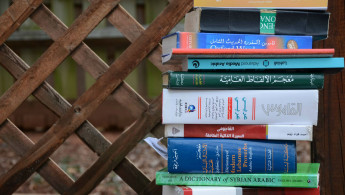Preserving Syria's linguistic heritage internationally with new dictionary
One common problem faced by refugee families bringing up children in foreign countries has always been preserving the language of their homeland.
The millions of Syrian refugees now living across the globe are no exception, with many struggling to ensure that the next generation will come to grips with the deep ocean that is the Arabic language and its multitude of local dialects.
One hobbyist linguist has decided to try and help Syrians living in the migrant diaspora safeguard their mother tongue and linguistic heritage.
Hossam Abouzahr is raising funds to employ Syrian refugees to complete an online multi-dialect Arabic dictionary, which focuses on the Levantine dialects and Modern Standard Arabic (Fusha) – a lexicon made by refugees for refugees.
"Refugees find it very challenging to preserve their language as the tools aren't available for them. Most people do not know how to teach their kids as they do not know how to explain grammar and the differences between Fusha and dialects," the Lebanese-American self-described jack of all trades told The New Arab.
 |
Refugees find it very challenging to preserve their language as the tools aren't available for them. Most people do not know how to teach their kids as they do not know how to explain grammar |  |
He explained that his free resource The Living Arabic Project is designed for both the offspring of displaced Syrians and second-language learners.
 |
|
| Millions of Syrian children are growing up in the migrant diaspora [Getty] |
"I am staying focused on the really practical aspects of language and what people are really going to search for and what kids are going to need to know when they're growing up.
"They might hear a word and then want to go and look it up or they might be like how do I say 'truck' in the Syrian dialect," Abouzahr said.
The 32-year-old, who has been working on the Syrian crisis for the past five years in one capacity or another, plans on enlisting the aid of out-of-work Syrians living in the US and Europe for the data entry process.
"One potential helper has been living in Germany for a year and a half. He is an engineer with good English language and programming skills but has been assigned to a town of 20,000 people and cannot find a job," Abouzahr explained, adding: "He is thrilled with the idea of working on the project."
Abouzahr, who has been working on his labour of love for the past eight years and has already finished an Egyptian Arabic dictionary, launched a campaign last month through crowd-funding site Kickstarter to raise a target sum of $50,000.
Arabic is one of the most difficult languages to learn for non-native speakers; unusual phonetics and many vastly different dialects united by a common standard language leaves many bachelor degree graduates with poor spoken Arabic skills. The children of Arab immigrants often have weak literary Arabic and little understanding of dialectical varieties other than their parents'.
 |
Arabic is one of the most difficult languages to learn for non-native speakers; unusual phonetics and many vastly different dialects united by a common standard language leaves many bachelor degree graduates with poor spoken Arabic skills |  |
For example, a simple word such as "cat" changes drastically between dialects with Egyptians saying 'utta, Levantines biss or bsayni, Sudanese kadis, Iraqis bazzoun, Bahrainis sannoura and Moroccans mush with dozens of more variations.
Standard Arabic, which is taught to Arabs in school is the language used in writing and in the most formal speech, has no native speakers, with Arabs communicating with each other in their local dialects, which can be incomprehensible to Arabs in other parts of the region.
"It was a miserable class. I would memorise a bunch of stuff without ever understanding it but enough to pass my tests," said Abouzahr, who attended a private Islamic school.
During graduate school he decided to give the language another shot after a fire for language learning was ignited while in South Africa working for the Peace Corps.
"The more I studied the more came back to me and what actually came back to wasn't the eight years of classes I had growing up of Fusha – it was actually a lot of the songs that I had learned with my grandparents growing up and games that I had played. The fun stuff, the stuff that had pleasant memories," he said.
He explained that his dictionary life began as a word list on his computer and that it has now grown into an online compilation of his extensive notes, out of copyright works and translations of Arabic dialectal dictionaries.
Are you trying to teach your children Arabic or are learning it yourself? What difficulties have you encountered? Would this dictionary help you in your studies? Let us know in the comment section.



